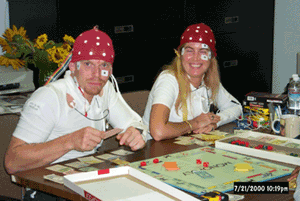|
|
 |

|
 |
 |
Psychophysiological Studies of Altered Gravitational Effects on Human Autonomic and Central Nervous System Function
 Adaptation is defined as the "modification of an organism or its parts that makes it more fit for existence under the conditions of it's environment". Perhaps individual differences in the ability to adapt to microgravity are related to differences in autonomic plasticity. Autonomic neural plasticity is a term which describes the capability of organisms to modify ANS function through learning. Psychophysiology is the study of the relationship between behavior and physiology. The purpose of this research is to address the NASA requirement for ground-based and space flight studies examining the vestibular / autonomic interaction as related to adaptation to microgravity and readaptation to Earth. The primary goals of this work are to (i) understand the mechanisms by which behavioral (Autogenic Feedback Training Exercise AFTE - an autonomic conditioning procedure), and pharmacological countermeasures (e.g. scopolamine, promethazine and phenytoin) improve tolerance to motion and space motion sickness, and (ii) determine the treatment method most likely to be effective for facilitating adaptation to microgravity and re-adaptation to Earth with minimal side-effects. Through AFTE it may be possible to learn more about the influence of CNS (or cognitive) activity on other space flight related biomedical problems as well, such as post-flight orthostatic intolerance. By understanding individual differences in ANS function when exposued to altered gravity, we may be better able to develop and evaluate countermeasures needed to facilitate adaptation. Adaptation is defined as the "modification of an organism or its parts that makes it more fit for existence under the conditions of it's environment". Perhaps individual differences in the ability to adapt to microgravity are related to differences in autonomic plasticity. Autonomic neural plasticity is a term which describes the capability of organisms to modify ANS function through learning. Psychophysiology is the study of the relationship between behavior and physiology. The purpose of this research is to address the NASA requirement for ground-based and space flight studies examining the vestibular / autonomic interaction as related to adaptation to microgravity and readaptation to Earth. The primary goals of this work are to (i) understand the mechanisms by which behavioral (Autogenic Feedback Training Exercise AFTE - an autonomic conditioning procedure), and pharmacological countermeasures (e.g. scopolamine, promethazine and phenytoin) improve tolerance to motion and space motion sickness, and (ii) determine the treatment method most likely to be effective for facilitating adaptation to microgravity and re-adaptation to Earth with minimal side-effects. Through AFTE it may be possible to learn more about the influence of CNS (or cognitive) activity on other space flight related biomedical problems as well, such as post-flight orthostatic intolerance. By understanding individual differences in ANS function when exposued to altered gravity, we may be better able to develop and evaluate countermeasures needed to facilitate adaptation. |
|
|